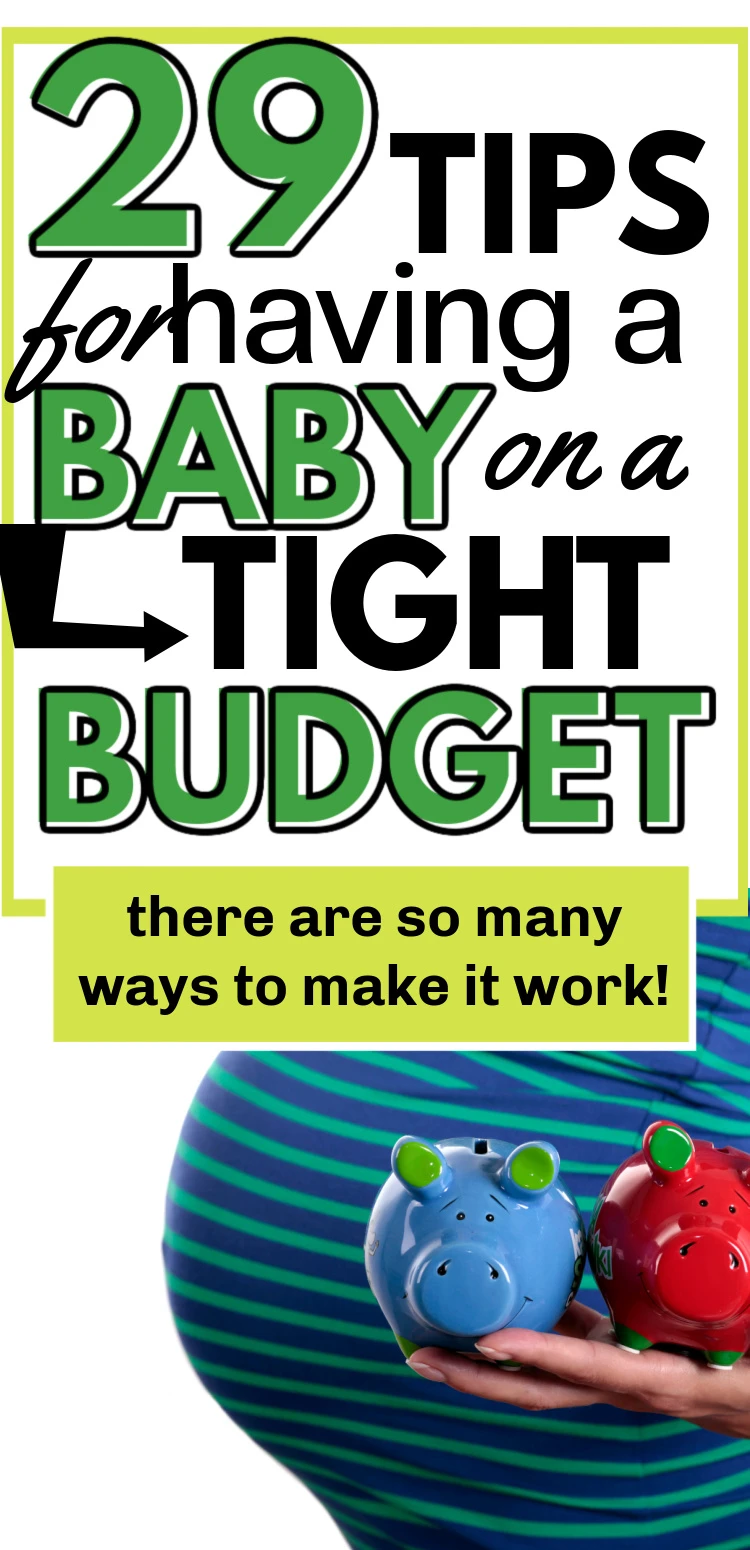Inside: When you’re having a baby on a tight budget, the planning phase can feel SUPER stressful. But it doesn’t have to be! Use these 25+ realistic tips from a mom who’s been there, and learn how you can afford all those extra baby expenses.
There’s an old saying that if you wait until you have money to have a baby – you’ll never have a baby.
As a mom of four, I can pretty much certify this as fact.
Even though we were far more financially stable with our last child than with our first, there never seemed to be a time when I felt our budget was bulletproof against baby expenses.
(Of course, it doesn’t help if you’re the household CEO and general worry-wart of the family.)
For us, it was actually our third baby that inspired me to get really creative with our finances, and our lifestyle habits.

Will Staying Home or Not Staying Home Help You Budget for a Baby? It Depends…
THIS POST PROBABLY CONTAINS AFFILIATE LINKS. AS AN AMAZON ASSOCIATE, I EARN FROM QUALIFYING PURCHASES. YOU CAN READ OUR FULL DISCLOSURE POLICY HERE.
Because each family has individual needs, no one can really tell you whether staying home or working outside the home is your best option.
However, childcare costs can be one of the biggest deciding factors.
I would suggest researching these costs in your area early in your pregnancy. Then, make up a budget based on what childcare will cost each month.
If most of your monthly income is going out the door to pay someone else to watch your baby…it may not be that hard to decide.
And then, there’s also the emotional impact of leaving your baby all day, that can catch many career-minded mamas off guard.
When I had my first baby, I had the finance part mostly figured out. Returning to work seemed logical – on paper, anyhow.
But I was not prepared for how hard the working-mom transition would be!
I continued to work outside the home with my oldest two kids for a while. But I never had the same career “drive”, even as my kids got a little older.
Keep in mind, you could always stay home just for the first year. You don’t need to commit to being a long-term stay-at-home mom right away if that’s not what you want, or what you can afford.
Make sure to consider the long-term ramifications on overall earnings before making a decision beyond the first year (THIS book has a lot to say on the topic!).
The bottom line? Motherhood changes you. Be prepared to flex!

29 Tips for Having a Baby on a Tight Budget
By the time I was expecting Baby #3, I had just left my job of 10 years for a work-at-home gig. It seemed like it would be the best of both worlds once our little boy arrived.
During that time, it took awhile for my income to bounce back, though.
So I did have to learn how to cut corners- drastically in some ways- and be ok with a different lifestyle than we were used to.
Many of the strategies I’m sharing are simple things which really did help to ease us through a lean time. And some are things I wish I had done, as well.
So if you’re having a baby on a tight budget (and you feel like you have NO money) like we were, don’t panic! Moms have been juggling babies and budgets for centuries.
There is always a way. Below are 29 ideas, for starters.
1. Start saving, like yesterday.
Having an emergency fund can seriously help you sleep at night when you have a newborn.
Especially if you’re still operating on two incomes, take advantage of that.
If it comes to paying off debt versus the emergency fund, choose the emergency fund FIRST. Try to pay off any high interest debt, and leave the low interest debt until after baby is born.
Not to scare you, but just never know what kinds of additional costs will come with a baby, from a difficult birth to NICU stays.
No one plans on these things, but an emergency fund can always help.
2. Breastfeed, if possible.
Have you looked at the cost of formula lately? If not, you’re in for major sticker shock!
I read all the breastfeeding books prior to having our first baby, to have the knowledge and confidence to make it possible.
Literally all the women in my family discouraged me from having much hope, because of the breastfeeding difficulties they experienced.
But I refused to be dissuaded.
And guess what? With lactation services (and a lot of stubbornness), we not only succeeded, but continued the journey for fifteen months.
Breastfeeding can save as much as $3,300 in the first year alone. That’s assuming your child doesn’t need a specialized formula, which can cost even more.
3. Buy used (but buy smart).
Garage sales, consignment stores, and even Amazon warehouse deals can turn up high quality baby gear with just a little patience and luck.
We have to remember that things like bouncy seats, swings and baby toys are really (I mean really) temporary.
Babies grow out of these things as quickly as clothing, so having the latest and greatest gear really isn’t that important in the scheme of things.
However, always keep safety in mind. Most quality secondhand shops will be aware of recalls, but you’ll want to do your due diligence in inspecting any used items you are unfamiliar with.
Car seats are one item to generally avoid buying used, unless you know without a doubt it hasn’t been involved in a vehicle wreck and is within its expiration date. The plastic can become brittle over time, making them potentially unstable.
There are also free car seats available through many local health departments and nonprofits nationwide.
Related: Minimalist Baby Essentials – The Bare Minimum You Need for a Baby
4. Make the most of your baby shower.
When a family member or friend offers to throw you a baby shower, make the most!
Really think through what you put on your baby registry and maximize the heck out of it.
Only put your top priority items on the list, and be strategic about the big $$$ things, like a stroller or a crib or cloth diapers. You probably only want one really expensive item on there.
If you’re planning on using disposable diapers, ask whoever is throwing your shower if they can ask people to bring a pack of diapers with their gift (and receipts). Every little bit helps!
5. Go generic.
This seems like rocket science, right? But honestly, there was a time I was afraid generic diapers wouldn’t do the job.
In recent years, though, generic brands have come a long way in quality.
Right now, my sister prefers the Aldi brand of diapers over the name brands (others swear by Costco’s Kirkland brand).
We both loved Aldi baby food, too. Well, at least the babies seemed to.
6. Find diapers on Marketplace
This is one of my friend’s best tips for saving money on diapers!
Lots of moms buy diapers in bulk, and then when their baby hits a growth spurt- guess where they turn?
So if you’re willing to meet up locally, you can sometimes find partial packs or even unopened packs of diapers at super cheap prices through your local Facebook Marketplace groups.
7. Try cloth diapers
It may sound crazy, but cloth diapering can actually be easy once you get the hang of it. You’ll never have to worry about running out of diapers in the middle of the night, either.
Best of all, you can save hundreds, up to a few thousands of dollars the first three years with reusable diapers.
Related: The Pros and Cons of Cloth Diapering (Real Talk from a Former Fanatic)
8. Stick to a very basic baby wardrobe.
While it’s tempting to spend your lunch hour hunting down the cutest boutique clothes EVER, this is your frugal friendly reminder: don’t add to cart so fast.
Babies really only need a very basic capsule wardrobe: handful of sleepers, some onesies and socks. Our kids practically lived in cotton zip up sleepers for the first nine months or so.
Honestly? They’ll just throw up and get poop stains on everything.
So focus on the essentials and you won’t be so sad when they do.
9. Don’t be ashamed or afraid to take advantage of aid programs if you need them.
There are so many amazing programs designed to give a hand up to families and their new babies.
- Pregnancy Resource Centers: Free pregnancy tests, sonograms, education and baby supplies (services vary per location, but many also help to connect you to the other resources listed below.)
- Pregnancy Medicaid: Free or reduced health care coverage which is income based – but many more families qualify than they usually realize.
- WIC: Nutrition assistance, including formula and baby food.
- SNAP: Food stamps for families and individuals.
- Food Pantries – Supplemental grocery items (and often more).
- Job training and placement services.
Please don’t be afraid to use these! Don’t be too proud or ashamed.
The US especially is horrible about family support, so take advantage of the programs they do offer.
10. Shop around for prenatal care, and consider secondary insurance.
Sometimes women make too much for pregnancy Medicaid, but their prenatal care bill is a burden, even with insurance.
Some couples solve this problem with secondary insurance. Although, be careful with this one, as I’ve heard horror stories about neither insurance wanting to play the primary insurer.
THIS couple purchased secondary insurance just for their pregnancy and labor/delivery bills. It worked out great for them!
Others solve this problem by choosing their prenatal care carefully. Ask your family physician and friends for recommendations.
Midwives – either private or as part of a hospital system- are becoming more popular and can be more affordable in some instances.
Community-based or rural health care centers usually offer sliding scale fees for office visits, too.
After labor and delivery, you can also ask the hospital billing department itself if they would give you a discount for paying your bill in full, instead of making a payment plan, OR if there is any financial aid available.
11. Develop a strong support network.
This can sound like trite advice, because it’s one of the hardest things a new mom might face. If you’ve recently moved to a new area, this requires extra work, for sure!
But family, friends, church groups, and mom groups can all help you emotionally (the struggle is real), and they can be invaluable sources of practical support, as well.
Being able to trade things like childcare, or tapping into a hand-me-down network, is invaluable!
12. Eat at home.
It’s not fun, but keeping restaurant meals and fast food stops to a bare minimum is one of the biggest ways our family is able to stick to our food budget each month.
When I left full-time work, I learned how to make bread at home. This made sandwich-making a little less mundane.
I also replicated several copycat restaurant recipes so we could still enjoy those dishes on the weekends.
One easy way to cut food costs is to make freezer meals as your due date nears. Then, when you have time to cook later on- continue to double them and freeze those, too.
It’s almost always cheaper to double a recipe than to make separate meals.
13. Plan for those days when you CAN’T eat at home.
Despite the best intentions, there will be days with doctor’s appointments, visits to grandma’s and days when you just need to get out of the house.
Trust me- running to the nearest drive-thru can feel like just the escape you need when your baby has been crying all day and you aren’t sure if it’s day or night, exactly.
There were some days I certainly did escape and knew my sanity was worth the expense of a $5 burger meal (McDonald’s 2 for $3.50 menu might not be healthy, but it’s filling and cheap).
But what really helped me was to try to schedule those escapes, instead.
So if I could get through an entire week without any fast food runs, I would treat myself with a Friday lunch out. But ONLY if that money was still in the “extras” budget for that month.
14. Delay purchases.
When I’m trying to decide whether something is a want or a need, I like to just put it off until at least 2 weeks.
By then, I usually know whether the frenzy has passed or if it’s something we really need.
15. Make your own baby food, or try baby led weaning.
Besides making your own food at home, you can easily make baby food at home to save even more.
Homemade baby food is usually healthier, and you know exactly what’s in it. Purees can be frozen in ice cube trays for easy, pre-portioned storage.
Baby led weaning can be another great option, though I never had the bravery for it.
16. DIY household and baby products.
There are SO many household items that cost pennies to make at home.
When we cloth diapered, we used baby washcloths with water, instead of baby wipes. They’re super easy to throw in with the cloth diaper laundry. (Use distilled water in a spray bottle.)
Also, think about hand soap, body wash, dish soap, laundry soap…the list goes on.
Many of those items have effective DIY recipes you could make in bulk, on the cheap.
Pro Tip: You don’t need to use special baby laundry detergent, either. Anything that is formulated for sensitive skin will work (even many DIY recipes).
17. Resell used items online.
From someone who has done a lot of online resale, I suggest spreading the net wide.
Duplicate your listings across Facebook marketplace, Mercari, and Poshmark for quicker sales.
For bigger baby gear, large lots of clothing or bulky household items, stick with local meet-ups (and with people you trust). Listing them on your own Facebook page can lead to some easy quick sales, too.
If you have a lot of cute pre-pregnancy work attire you won’t be needing anymore, you can also send them in to ThredUp for store credit, or cash.
18. Have swap meets with friends.
If you have regular meet ups, play dates or park days with friends, see if they would be interested in a “free yard sale” a few times a year.
We actually do this at our church, and at another moms’ group.
You can either shop from each other’s trunk in the parking lot, or set up a table to swap and trade outgrown baby and kids’ clothes, kitchen items – you name it!
19. Unsubscribe from all the baby store emails.
I used to be tempted by every clearance sale that landed in my inbox. So, I learned to hit unsubscribe faster than I could skim the emails. 😉
I know where you are IF I need you, Zulily.
20. Look for free entertainment (without subscriptions).
Streaming TV, Apple music, Audio books. Those are all things we have paid for from time to time– until I learned to find free alternatives.
When you have a new baby, there is honestly very little time for much entertainment anyhow!
(I mean- babies become your new entertainment. In a good way.)
But swapping to free podcasts, free audiobooks (through the library) and sticking to free TV channels, or choosing just one streaming subscription service, has saved our family a lot of money each month. Even $5 subscriptions can really add up.
21. Stay healthy.
Some things are outside of our control. Kids get sick, and it’s just a part of life.
But as much as possible, keeping your family’s immune system tuned up is one of the best ways to save money.
This way you can avoid ER or urgent care trips, and the hefty bills that come with them.
Ask your healthcare provider or pediatrician about vitamins and supplements that can boost the immune system. It’s helped us a lot over the past few years!
22. Trade babysitting with other trusted moms.
If you have friends who stay at home, or work different shifts, you might consider swapping childcare to save money.
Even just as a backup plan or for date nights – it can be a real blessing for everyone involved.
23. Take your own newborn photos (and maternity, too!).
Newborn photos can be really pricey. But Pinterest is full of great newborn photography tips!
With a simple textured blanket, a basket and some daylight streaming through a window- you, too can be a photog. (Or at least fake it.)
I took photos of my newborn niece by following some basic tutorials.
24. Resist elaborate holidays and birthdays.
Vote YES to celebrating people and events. Vote NO to spending tons of $$ on said celebrations.
That’s my philosophy, since having kids!
So repeat after me: My baby does not need a store-bought Halloween costume that they likely won’t wear for 5 minutes and definitely won’t remember. My baby does not need a $40 smash cake that they likely won’t eat and definitely won’t remember.
Again, DIY will be your friend for many years to come.
Save your celebration dollars for the teen years, when they won’t be * quite * as impressed with simple entertainment.
25. If you’re debating buying a house v. renting, hold off on buying the house for a year.
New homes come with a LOT of unexpected expenses.
Pipes break, electrical outlets fail and appliances most definitely break. And all of those things are VERY expensive.
You are also pretty tempted to spruce up a new house with new everything. Even if you shop at IKEA, the costs add up.
I know the rental market is crazy right now, but if you’re having your first baby, buying a house might need to wait. It can be a lot like having a new baby, buying a house.
Unless the stars align – great interest rates, a never to be seen again deal, a government loan with no money down – rent for baby’s first year.
26. Move to a lower-cost area, or downsize.
This is obviously the most extreme tip on this list.
But, I have many (like a dozen) friends who moved to my small, rural community in part because of the high cost of living elsewhere.
Many young families take a hard look at the cost of childcare, food, gas and utilities in their area, and decide it isn’t worth it anymore. Even considering their well-paying jobs, sometimes the stress of managing it all is just too much.
So you might find that living a slower-paced life with less of everything (income, traffic, entertainment options…) is actually a good trade. Only you can decide!
The only caveat to this is if you have a SUPER strong support system, moving may be too high a price. They are literally priceless.
If you want to stay put — maybe a smaller home would make the difference? We’ve lived in some tiiiiny spaces with kids, so just know that it’s very do-able.
27. Focus on contentment.
Some things may have to go on the backburner for now: big vacations, new vehicles and trendy clothes. Even small splurges may have to be few and far between.
But just because you can’t do those things now, doesn’t mean they won’t be just as fun later on. If things feel difficult, remember: this is a season – not a life. (Repeat that phrase as needed.)
Your circumstances will flux over time, but don’t let your current lifestyle changes keep you from enjoying what really matters right now.
28. Remind yourself that you can do anything for a set period of time.
Maybe you’ve decided to only stay home for a year.
Barring any extreme emergency expenses, anyone can make a tight budget work for a year!
29. If your budget is just too tight, consider a side hustle.
Whether you’re already working outside the home or not, it might eventually become clear that you don’t have a spending problem, but an income problem.
If you’ve run the numbers again and again and cut all the things and you STILL can’t figure out how to make it work, it might be time for a side hustle.
I know moms who have…
- taken on weekend home-care shifts while dad watches baby
- managed social media accounts from home
- sold baked goods (sourdough bread or desserts), and
- ran DoorDash deliveries a few evenings a week.
If you’re starting your own business, don’t forget to figure in taxes and overhead costs, when deciding how much you really need to bring in to fill in your budget gap.

If You’re Having a Baby on a Tight Budget, You’re Not Alone
Sometimes it can feel isolating when you have to say no to fun outings or doing things you did pre-baby. Sticking to a budget can take a lot of discipline.
However, you should know that nearly all families feel the pinch as their family expands.
What you see on your friend’s Instagram page is probably not a good indication of this, either. Truth be told- most families are drowning in debt these days.
So you are definitely not alone!
You’ve just made the really good choice to live within your means. And you should be proud of that.
In reality, there is never a perfect time to have a baby.
But my hope in writing this post is to help you to look forward to your new arrival without your (lack of) finances overshadowing this incredible occasion.
I’m here to assure you- from experience – that you can have a baby on a tight budget. With just a little creativity and planning, you have nothing to fear.
Do you have any tips about having a baby on a tight budget? Share in the comments!
Read Next: 12 Simple Ways to Organize Baby Clothes Without a Closet

Brandi is a mom of four who can usually be found in the kitchen, the garden, or under a pile of laundry somewhere. She writes about faith, family and homemaking at Chicken Scratch Diaries. You can catch her most recent posts on Pinterest.